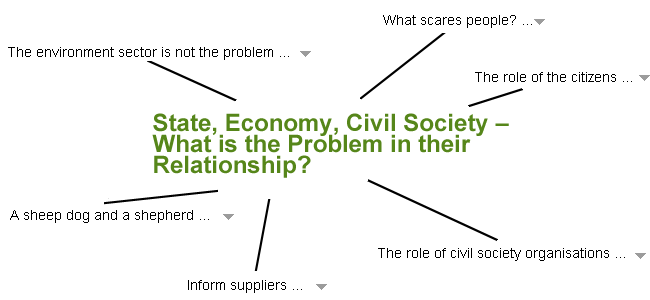
A sheep dog and a shepherd
“We use the analogy of a sheep dog and a shepherd working together. If you're the sheep dog you have to bite at the heels of the decision makers. You have to make them fearful in order to get them moving. You need shepherds to show those frightened sheep where to go, so give them policy.” (Jon Cracknell)
Inform suppliers
“It is very important for companies which have very long product life cycles, like for example, the car industry, to inform suppliers about the company’s biodiversity objectives and to integrate them accordingly.” (Christiane von Finkenstein-Wang)
The role of civil society organisations
“So what I said was you have to strengthen this bind with government. Andy is talking about the way we act and what often happens against certain issues is you have insiders like us who we really all cuddle up to the ministers and bureaucrats and talk things through and give them some good constructive suggestions. On the outside you've got Greenpeace and others who'll do the shouting and lobbying and media work (…). A lot of it's got to do with making them feel political pains, so that there is a consequence to what they do. The RSPB we know that all members are, we know how many we've got and every constituency and if an issue comes up for example we lobby the treasury around the budget, we know we'll have 5, 6, 7 thousand people waiting in the treasure on a particular issue. And that is what makes them respond to things.” (Paul Morling)
The role of the citizens
Question: “I was wondering who in your opinion should facilitate the inter-sectoral cooperation between state, economy and civil society?”
Strachwitz: “That is a very interesting question. ...If we really think of those three arenas - I like the word arena, and again, I did not invent it, because, within an arena things are moving, it is not like a pillar which is sort of static - if you think of these three arenas, none of which is superior to another and if you think of the citizens in the middle, anyone can start. We're all called upon to start within the scope of our abilities, our networks, and so on. It all starts from the citizens. Every citizen should start thinking about it and everyone working in any arena, most of us obviously are usually, we change from one to the other. Even if this shocks some people, we're in several arenas at the same time, and we all have the chance to start something. This is very much a civil society approach of course. We're not basically called up to do something, we start something.” (Rupert Graf Strachwitz)
What scares people?
“People like talking about civil society, about civic engagement, volunteerism, .... all these things, donations, giving, philanthropy, they think it is a good thing. But when it comes to the hard facts, the power game, to the decision making processes, then people get very much afraid of it. When it comes to new ways of finding solutions to problems they get very scared.” (Rupert Graf Strachwitz)
The Discussion
State, Economy, Civil Society – What is the Problem in their Relationship?
© 2026 Leibniz-Zentrum für Agrarlandschaftsforschung (ZALF) e.V.
Online: http://pes-conference.civiland-zalf.org/following-the-discussion/state-economy-civil-society/index.php
Datum: 22.01.2026

The environment sector is not the problem
“The Welsh Assembly Sustainability committee said that actually - they didn't consider the environment sector as being the problem. They said that the problem is that the policies of the other sectors – economic developments, infrastructure, energy – don't support environmental policy, and that was perceived to be the main reason why goals have been missed.” (Morgan Parry)